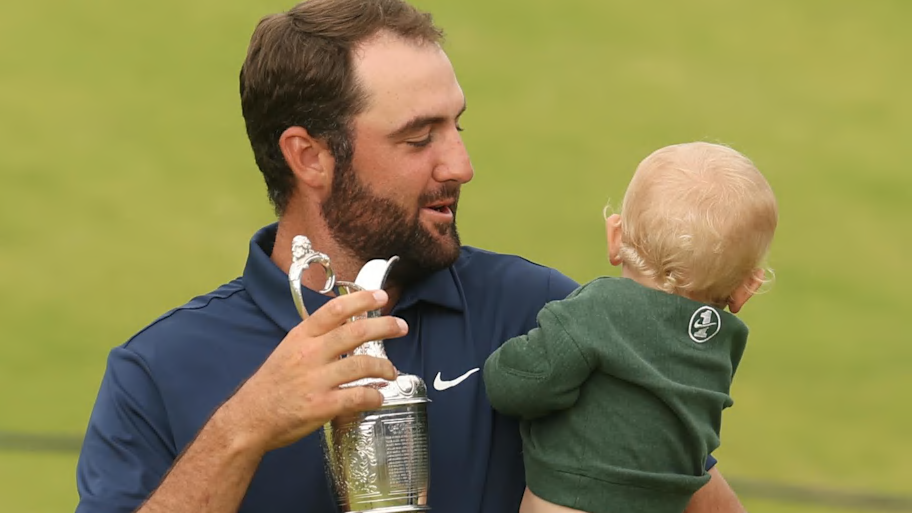Tunnel Vision. That was the headline of a 2000 Sports Illustrated feature story on Tiger Woods by S.L. Price. In a photo accompanying the story, Woods illustrates with his hands cupped around his eyes the great focus that would lead him that year to nine wins, including three of the four major championships. Since turning pro in 1996, he had laid everything aside that was nonessential to dominate professional golf. He was on a mission to set a new standard of greatness that not even past greats like Bobby Jones, Ben Hogan and Jack Nicklaus could match. It was all prophesied by his father, Earl Woods.
During the Open Championship at Royal Portrush, I thought about the 15-time major champion’s intense focus as I watched Scottie Scheffler slowly and methodically take his first Claret Jug with a four-shot win over Harris English. Earlier in the week, Scheffler, who has been No. 1 in the world for 147 consecutive weeks, had caused a minor scandal in the golf world when he dared to suggest that winning golf tournaments wasn’t the biggest and most important thing in his life.
“To get to live out your dreams is very special, but at the end of the day, I'm not out here to inspire the next generation of golfers,” he said. “I'm not out here to inspire someone to be the best player in the world because what's the point? This is not a fulfilling life. It's fulfilling from the sense of accomplishment, but it's not fulfilling from a sense of the deepest places of your heart.”
The 29-year-old Dallas resident came off to some as the anti-Tiger Woods. How could the most dominant player in the world since Tiger not reach for the Big Cat’s mantle of focus and surety of purpose around the game of golf? What does it say about the state of the game if its very best player brought a measure of malaise to the game’s oldest championship? By the end of the tournament when he was holding the Claret Jug, he affirmed his gratitude for winning major championships, but he still held firm to his earlier comments.
Scheffler never really made clear what fulfills the deepest places of his heart. After he holed out on the 72nd hole for a three-under par 68 and a 17-under par total, he was asked what gave him peace and he didn’t say. I suspect that it’s family and his Christian faith that gives him that peace. For him, playing golf for a living for great sums of money—nearly $20 million in PGA Tour earnings so far in 2025—is a blessing from God that he must steward with hard work.
But he doesn’t owe us perfectly crafted explanations that could satisfy our need to reduce his life to athletic performance. Projecting on him Kobe Bryant’s Mamba mentality or Tiger’s grit and otherworldly talent doesn’t make him a better champion. He just wins without all the pretense about wanting it more than anything in the world. That may not endear him to super fans who want more passion from their heroes, but it’s right for him.
“I'm not motivated by winning championships,” he said on Sunday. “I don't look at the beginning of the year and just say, hey, I want to win X amount of tournaments. When I wake up to practice, I feel like what motivates me is just getting out and getting to live out my dream. I get to play professional golf, and I feel like I'm called to do it to the best of my ability.”
Jordan Spieth, who for a time was the best player in the world during his magical season in 2015 when he won the Masters and the U.S. Open, tried on Sunday afternoon to bring some perspective to his fellow University of Texas alumni and Dallas resident.
“He's not transcending the game like Tiger did,” Spieth said. “He's not bringing it to a non-golf audience necessarily. He doesn't want to go do the stuff that a lot of us go do, corporately, anything like that. I think it's more so the difference in personality from any other superstar that you've seen in the modern era and maybe in any sport. I don't think anybody is like him.”
Scheffler is far from being the only athlete to ever put his family and faith ahead of winning golf tournaments or to recognize the limits of fortune and fame on the human psyche, but it’s hard to recall a time when one showed up at a major event and announced that they were there to win but that the feeling of joy at winning might only last a few seconds. That may say more about the careerism and standards of success that drive our culture than it says about Scheffler as a person.
On Sunday afternoon at Royal Portrush, it took Scheffler just a few seconds to hug his wife, Meredith, and 1-year-old son, Bennett, and his parents off the 18th green. Perhaps, that’s all the time he needed to absorb the reality that he was the Open champion. He couldn’t be more focused on what mattered the most to him and it wasn’t winning the Claret Jug.
More Golf Coverage on Sports Illustrated
This article was originally published on www.si.com as While Winning at Portrush, Scottie Scheffler Reminded Us Again What Matters Most.
